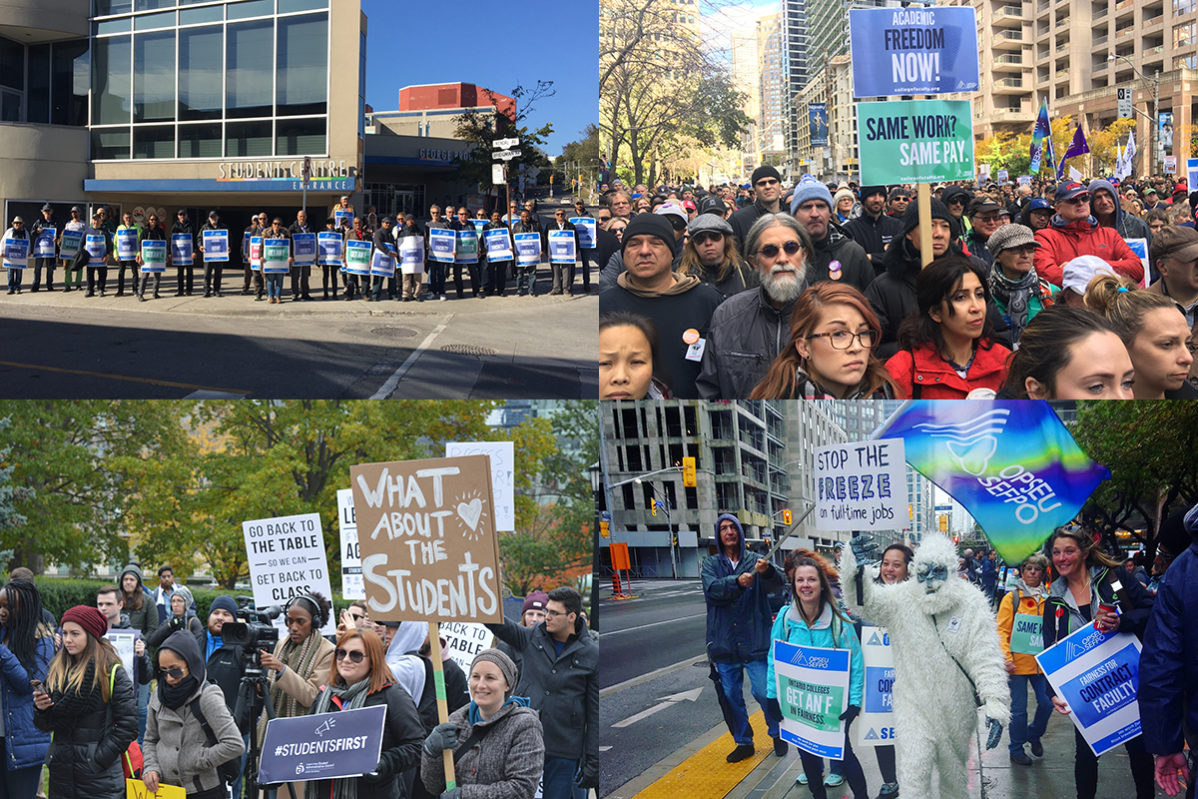With talks broken down again between the College Employer Council (CEC) and the Ontario Public Employees Union (OPSEU) teams, we look at the milestones before and since the strike
| July 4-7
First round of talks: union files for conciliation
|
After the talks, CEC said they laid out six goals for bargaining, including negotiating a “fair and reasonable settlement for our faculty,” broadening the colleges’ ability to “deliver quality programming in a flexible manner,” and “preserving the sustainability of colleges as public institutions.” |
| OPSEU said they presented their key issues to the colleges including establishing academic freedom and collegial governance, strengthening of faculty’s intellectual property rights and a workload formula for counsellors and librarians. On July 11, the union announced they filed for conciliation with the Ministry of Labour, which allows both sides to set a deadline for a strike or lockout. | |
|
|
|
| Aug. 1
Second round of talks: union asks for strike vote date
|
CEC offers a four-year contract extension. According to an August 16 release, the offer included a 7.5 per cent salary increase over four years, a new maximum salary of $115,094 and “positive changes to pregnancy and parental leave.” The CEC said they believed their offer would form the basis of a settlement, was time limited and based on the union agreeing to an early settlement. |
| The union bargaining team said they presented a set of proposals which will create more full-time jobs for faculty, provide equal pay for equal work, and improve job security for partial load faculty. The union bargaining team also asked the Ontario Labour Relations Board to set a strike vote date for early September. | |
|
|
|
| Aug. 3 | “College administrators seem all too happy to cut ribbons, eat cake, and attend parties to celebrate the anniversary of the system. But they don’t seem to want to do the work of actually taking a hard look at our colleges, or discussing with faculty what needs to be done to make them better.” – JP Hornick, chair, faculty bargaining team |
|
|
|
| Aug. 22-25
Three Days of Bargaining |
After the talks, the CEC said the union’s proposals would not be the basis of a settlement, and would costs an extra $400 million a year to implement. In a release, the colleges asked the union to withdraw their proposals and said that “strike potential is a growing concern.” |
| In a release, the union said the colleges offer would lock faculty into the “same contract terms that are failing us right now.” The union said that the colleges’ offer would increase “precarious, under-paid contract positions,” and had a clause that could lead to full-time faculty jobs cuts if changes to the Fair Workplaces, Better Jobs Act require higher wages for partial-load faculty. | |
|
|
|
| Sept. 14
68% of faculty votes to strike |
Responding the to the strike vote, CEC called a strike “unnecessary and disruptive to students.” The CEC also stated that the strike vote “puts the time the college system on the clear path to a strike.” |
| JP Hornick said that the strike vote “shows that the colleges really need to discuss the key issues at the table.” In a release the union said the treatment of contract faculty is a key issue, and that they teach with no job security and lower pay than full-time permanent faculty. | |
|
|
|
| Sept. 15 | “We’re committed to achieving a negotiated settlement, one that’s fair to our faculty while being responsible to employers we represent and that’s the colleges. At the same time we also need practical proposals from the union to be successful.” -Don Sinclair, chief executive officer of the CEC |
|
|
|
| Sept. 27-28
Both sides reject offers |
Following the rejection of their offer, the CEC said that union’s demand for a 50/50 ratio split between full time and part-time faculty would result in more than 3,000 faculty jobs being cut. The colleges said that they remain committed to finding a settlement. |
| Hornick said that the CEC rejected the union bargaining teams’ revised offer with “very little discussion.” In a release, the union bargaining teams said that it made “significant modifications” to its major demands to get the talks going. | |
|
|
|
| Sept. 28 | The conciliator sets Oct. 15 as earliest legal strike/lockout date |
|
|
|
| Sept. 29 | The conciliator tells both sides to stand down |
|
|
|
| Sept. 30 | Contract between colleges and faculty expires |
|
|
|
| Oct. 10
Faculty sets strike deadline
|
After faculty set a Oct. 16 strike date, colleges bargaining chair Sonia Del Missier said a strike now looks “very likely.” A CEC release said that OPSEU rejected the colleges’ “final offer,” which included a wage increase of 7.75 per cent over four years and a new maximum faculty wage of $115,378. |
| According to Hornick, the strike date was set following an offer by the colleges that was worse than previous offers. She said the colleges offer had some improvements on wages, “but those aren’t the key issues for us.” | |
|
|
|
| Oct. 11 | “They should try and compromise and the faster they can do that the faster we can move on and focus on coming to school without having to worry about not having school the next day.” – Yasmin Sundhu, fashion design program |
|
|
|
| Oct. 14-15 | In a release, CEC said that their last offer was responsive to negotiations and fair to faculty. The colleges added that they can’t accept the union’s demands which would add more than $250 million to yearly costs, and “jeopardize the quality of college programs.” |
| In a release, the union said its last offer is organized around a 50/50 ratio of part-time and full-time faculty, more job security for contract faculty, and giving faculty a stronger voice in academic decision-making. When the two sides failed to reach a settlement, Hornick said that the colleges were committed to a “Walmart model of education.” | |
|
|
|
| Oct. 16
Strike begins at 24 Ontario colleges
|
Del Missier called the strike completely “unnecessary and unfair to hundreds of thousands of students.” She added that the deal colleges offered the faculty was inline with other deals negotiated by OPSEU. |
| As 12,000 faculty hit the picket lines at 24 colleges across Ontario, JP Hornick said the CEC refused to agree even on “no-cost items” in the union’s proposal. “This leaves us with no choice but to withdraw our services until such time as our employer is ready to negotiate seriously.” | |
|
|
|
| Oct. 23 | Petition demanding students be compensated for the strike has more 100,000 signatures |
|
|
|
| Oct. 25
Minister Deb Matthews urges both sides to go back to the table |
“We want to get back to the table and resolve the strike and OPSEU knows how this gets resolved. We’ve been very clear and consistent and they’ve heard our message repeatedly throughout bargaining. They know exactly what our position is.” – David Scott, CEC spokesperson |
|
|
|
| Nov. 1
Colleges and OPSEU go back to the table |
The CEC said they asked the conciliator to call the union bargaining team back to the table on Nov. 2. David Scott, the CEC’s spokesperson said that “we never wanted a strike to occur and now that the strike has occurred it’s gone on long enough and we want to get this resolved.” |
| The union bargaining team said it’s interested in what the colleges have to say at the table. In a release, Hornick said that college faculty are ready and have been from the beginning to negotiate a contract that “addresses the issues of good jobs and quality education.” | |
|
|
|
| Nov. 6
Talks break down again George Brown announces the fall term is extended to Dec. 22, and winter intercession week is cancelled
|
After days of bargaining, the CEC said that OPSEU have refused to accept an offer that addressed the union’s issues. The colleges asked the Ontario Labour Relations Board to send their offer to the striking faculty to vote, which will take between five and 10 days. “It is a terrible outcome for students and faculty that OPSEU was unwilling to reach an agreement,” said the chair of the colleges’ bargaining team, Sonia Del Missier. |
| The union said that a settlement was close when the talks broke down. Hornick said that by calling the faculty to vote, colleges “could easily keep faculty and students out of their classrooms for another two weeks.” Hornick said she feels that the colleges “have done something that is reprehensible for students.” | |
|
|
|
| Nov. 7
Faculty to vote on colleges’ final offer Nov. 14-16
|
After receiving the colleges request, the OLRB sets Nov. 14-16 as the dates for faculty to vote on the CEC’s final offer. Colleges requested that faculty return to class in the lead up to the vote. In a release, Del Missier said “the colleges remain at the table, but we can’t just rely on bargaining to resolve the strike – and our students can’t wait. The faculty vote is another path to end the strike if bargaining is not successful” |
| The faculty bargaining team said that the two sides were close to a deal before the CEC forced the vote on their offer. Hornick encouraged faculty to vote no on the offer, which she was worse than the offer the two sides verbally agreed to at the table. “All they have done is hardened the resolve of faculty on picket lines across this province and made us more determined than ever to get a collective agreement that addresses our proposals about education quality and fairness for faculty,” she said. | |



